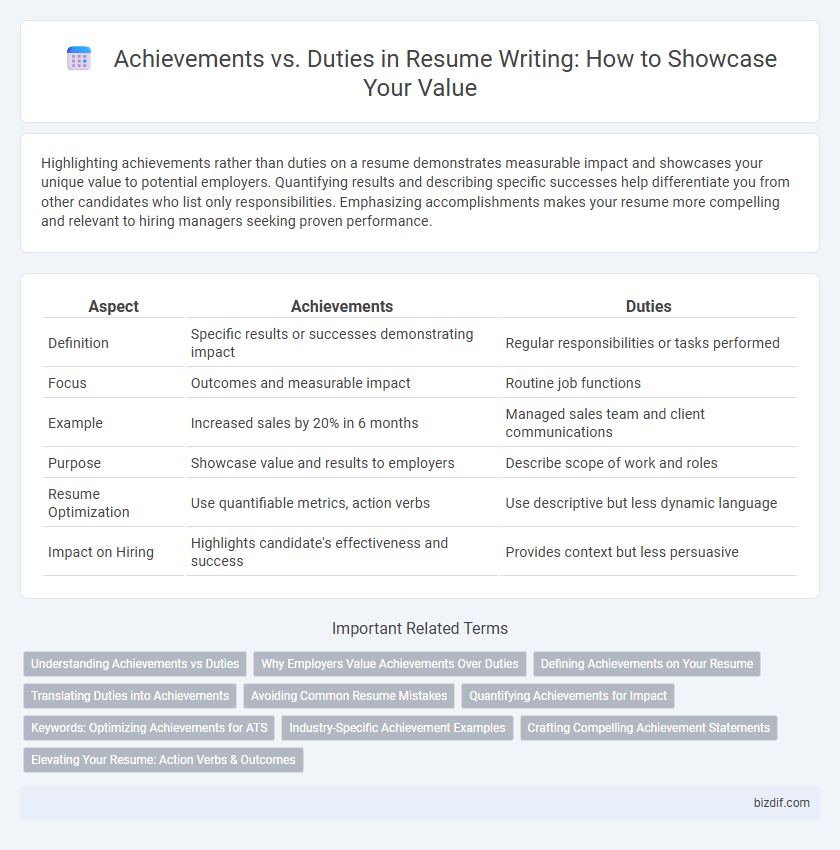Highlighting achievements rather than duties on a resume demonstrates measurable impact and showcases your unique value to potential employers. Quantifying results and describing specific successes help differentiate you from other candidates who list only responsibilities. Emphasizing accomplishments makes your resume more compelling and relevant to hiring managers seeking proven performance.
Table of Comparison
| Aspect | Achievements | Duties |
|---|---|---|
| Definition | Specific results or successes demonstrating impact | Regular responsibilities or tasks performed |
| Focus | Outcomes and measurable impact | Routine job functions |
| Example | Increased sales by 20% in 6 months | Managed sales team and client communications |
| Purpose | Showcase value and results to employers | Describe scope of work and roles |
| Resume Optimization | Use quantifiable metrics, action verbs | Use descriptive but less dynamic language |
| Impact on Hiring | Highlights candidate's effectiveness and success | Provides context but less persuasive |
Understanding Achievements vs Duties
Understanding achievements versus duties is key to crafting an effective resume that highlights your unique contributions rather than listing routine tasks. Achievements quantify your impact with measurable results, such as increased sales by 30% or managed a project that saved $50,000, while duties simply describe job responsibilities like answering calls or preparing reports. Emphasizing accomplishments over duties helps to demonstrate your value to potential employers and distinguishes you from other candidates.
Why Employers Value Achievements Over Duties
Employers value achievements over duties because achievements demonstrate measurable impact and the ability to deliver results, showcasing a candidate's proactive contribution to business objectives. Unlike duties, which merely describe job responsibilities, achievements highlight problem-solving skills and successful project outcomes. Quantifiable accomplishments provide concrete evidence of a candidate's value, making them more attractive in competitive hiring processes.
Defining Achievements on Your Resume
Defining achievements on your resume involves highlighting specific results and impacts you generated, such as increasing sales by 20% or reducing processing time by 30%. Unlike duties, which describe routine tasks, achievements demonstrate measurable success and contributions that set you apart from other candidates. Quantifying these results with data-driven metrics effectively captures employer attention and showcases your value.
Translating Duties into Achievements
Translating duties into achievements transforms generic job responsibilities into measurable results that demonstrate impact and value. Quantifying outcomes, such as increasing sales by 20% or reducing processing time by 30%, highlights specific contributions that differentiate candidates. Emphasizing achievements over duties enhances a resume's effectiveness by showcasing skills through tangible successes.
Avoiding Common Resume Mistakes
Highlighting achievements instead of duties significantly improves resume impact by showcasing measurable results and unique contributions, such as increasing sales by 20% or leading a successful project rollout. Avoid common resume mistakes like listing generic tasks without demonstrating value or using vague language that fails to quantify success. Emphasizing specific accomplishments and outcomes makes a resume stand out to hiring managers and applicant tracking systems (ATS).
Quantifying Achievements for Impact
Quantifying achievements on a resume enhances impact by providing clear evidence of success through measurable results, such as increasing sales by 30% or reducing costs by $50,000 annually. Unlike listing duties, which describe job responsibilities, highlighting achievements demonstrates your contributions and effectiveness, making your resume stand out to employers. Use metrics, percentages, and specific data to showcase how your efforts have driven tangible improvements and added value.
Keywords: Optimizing Achievements for ATS
Optimizing achievements in a resume involves quantifying results and using industry-specific keywords to enhance ATS compatibility. Highlighting measurable accomplishments such as "increased sales by 30%" or "reduced processing time by 15 hours weekly" improves keyword relevance and ranks the resume higher. Incorporating action verbs and metrics tailored to the job description strengthens the impact beyond listing routine duties.
Industry-Specific Achievement Examples
Highlighting industry-specific achievements in a resume demonstrates measurable impact, such as increasing sales by 20% in retail or reducing downtime by 15% in manufacturing. Tailoring accomplishments to relevant metrics and technologies showcases expertise beyond routine duties. Employers prioritize results-driven examples that align with sector standards and challenges.
Crafting Compelling Achievement Statements
Crafting compelling achievement statements in resumes highlights measurable results and specific contributions rather than listing generic duties. Use action verbs and quantifiable metrics to demonstrate impact, such as increased sales by 20% or streamlined processes, reducing project time by 15%. This approach distinguishes candidates by showcasing their unique value and proven success within previous roles.
Elevating Your Resume: Action Verbs & Outcomes
Highlighting achievements over duties on your resume distinctly showcases your impact through specific results and measurable outcomes. Utilizing powerful action verbs like "accelerated," "transformed," or "engineered" captures attention and conveys leadership and initiative. Quantifying accomplishments with metrics, such as "increased sales by 30%" or "reduced processing time by 50%," effectively elevates your professional narrative.
Achievements vs Duties Infographic

 bizdif.com
bizdif.com